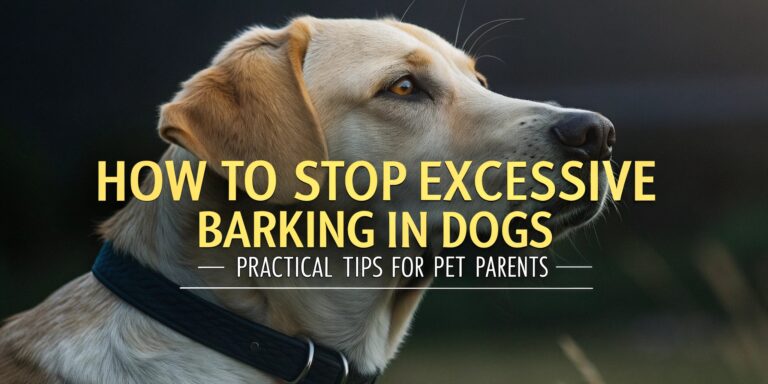Barking is a natural form of communication for Stop Excessive Barking in Dogs. But when it becomes constant or disruptive, it can lead to stress for both pets and their owners. Whether your pup barks at strangers, noises, or simply out of boredom, understanding the reason behind the behavior is the first step to finding a solution. Today, we’ll explore how to stop excessive barking in dogs with gentle, effective methods.
Why Dogs Bark Excessively
Dogs bark for various reasons, including:
- Alert barking (e.g., when they see people or animals)
- Attention-seeking (they want to play or get a treat)
- Boredom or frustration
- Separation anxiety
- Fear or reactivity
Identifying the root cause will help you apply the right method to reduce the Stop Excessive Barking in Dogs.
Read this: Best Dog Food for Allergies: Keep Your Pup Happy and Healthy
Address the Root Cause
Before applying any training technique, observe your dog. When do they bark? What triggers it? A dog barking due to anxiety will need a different approach than a bored dog.
Provide Physical and Mental Stimulation
A tired dog is a quiet dog. Make sure your pup gets enough exercise for their breed and age. Add enrichment toys, treat puzzles, and training games to keep their mind active and reduce boredom-related barking.
Train with Positive Reinforcement
Use commands like “Quiet” or “Enough” consistently. When your Stop Excessive Barking in Dogs on command, reward them with praise or a treat. Never shout it can reinforce the behavior or scare your dog.
Block the Trigger
If your dog barks at people passing by the window, block their view using curtains or frosted glass. If the trigger is a noise, white noise machines or calming music can help mask it.
Avoid Punishment
Harsh discipline or punishment can worsen anxiety and fear, leading to even more Stop Excessive Barking in Dogs. Stick with calm, consistent training.
Try Calming Aids
If your dog’s barking is due to anxiety, natural remedies like calming chews, dog-appeasing pheromone diffusers, or anxiety wraps (like the Thunder Shirt) can help ease their nerves.
Consistency is Key
Inconsistent reactions confuse your dog. Make sure everyone in the household responds to barking in the same way. Routine, predictability, and patience go a long way.
When to Seek Help
If you’ve tried everything and your dog’s barking continues or worsens, it might be time to consult a certified dog trainer or a veterinary behaviorist.
Read this: Best Dog Food for Small Breeds: What Every Pet Parent Should Know
Final Thoughts
Learning how to stop excessive barking in dogs requires patience and understanding. Every dog is different—what works for one might not work for another. But with consistency, compassion, and proper tools, you can help your furry friend feel more relaxed and teach them when it’s okay to be quiet.



1 Comment
Pingback: The Best 7 Morning Routine for Your Dog: Start the Day Right